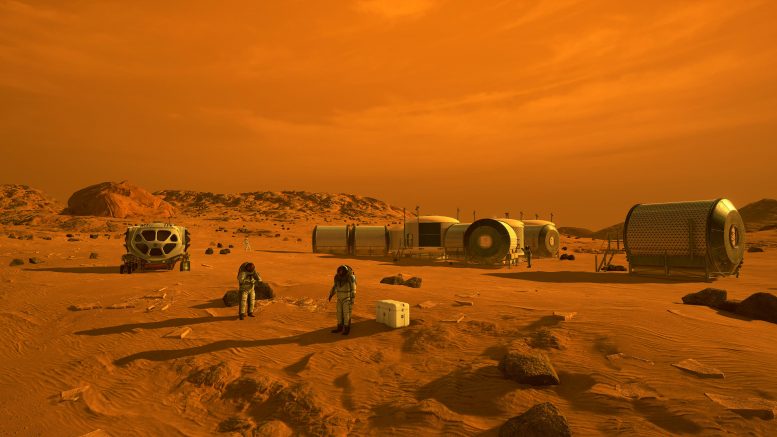Greenhouses Probably Won’t Work for Growing Crops on Mars Because of Cosmic Radiation

This artist’s concept depicts astronauts and human habitats on Mars. NASA’s Mars 2020 rover will carry a number of technologies that could make Mars safer and easier to explore for humans. Credit: NASA
Mars is a lifeless wasteland for more than one reason. Not only are the temperatures and lack of water difficult for life to deal with, the lack of a magnetic field means radiation constantly pummels the surface. If humans ever plan to spend prolonged periods of time on the red planet, they’ll need to support an additional type of life – crops. However, it appears that even greenhouses on the surface won’t do enough to protect their plants from the deadly radiation of the Martian surface, at least according to a new paper published by researchers at Wageningen University and the Delft University of Technology.
Ideally, agriculture on the Maritan surface would consist of greenhouse domes and allow what limited sunlight hits the planet to make it through to the crops they house directly. However, current technology greenhouse glass is incapable of blocking the deadly gamma radiation that constantly irradiates Mars. Those gamma radiation levels, which are about 17 times higher on Mars than on Earth, are enough to affect crops grown in greenhouses on the surface significantly.
UT video discussing how to live with in situ resource utilization on Mars.
The researchers ran an experiment where they planted garden cress and rye and measured the crop output of a group irradiated with Martian levels of gamma radiation with those grown in a “normal” environment with only Earth-level radiation. The crops in the irradiated group ended up as dwarves, with brown leaves, and resulted in a significantly decreased harvest after 28 days of growth.
To mimic the gamma radiation environment, Nyncke Tack, an undergraduate researcher who performed much of the work for the project, used 5 separate cobalt-60 radiation sources. These were scattered evenly overhead of the test crops to create a “radiation plane” similar to the ever-present radiation field on Mars.
UT video about colonizing the inner solar system.
Other confounding factors, including adding beta and alpha radiation, could also contribute to crop deterioration, though solid objects more easily stop those types of radiation. The research team, who was not surprised by their findings, suggests building underground farms where the planet’s regolith blocks most if not all of that radiation. This would have the obvious disadvantage of losing access to sunlight, but would have the added benefit of being a much more controllable environment, with LEDs and temperature control filling in for environmental conditions on the surface.
To prove their theory, the team is next commandeering a Cold War-era bunker in the Netherlands to see if their same irradiation experiments affect crops grown inside if the irradiation is coming from outside. While not a direct analog for Martian regolith, it’s a novel approach to understanding how humans might eventually farm the sky.
Originally published on Universe Today.
No comments:
Post a Comment